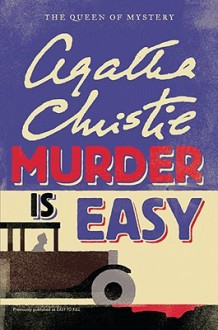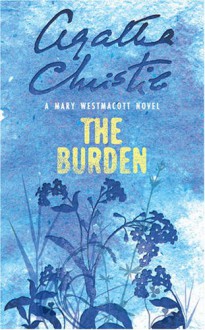
This was only my second time reading this book - the first time I read it, I remember being extremely underwhelmed. Like other Christie's, this one improved the second time I read it. This makes me wonder if rereading Passenger to Frankfurt will somehow turn it into The ABC Murders (kidding, kidding). I attribute this to the fact that I'm less concerned with Christie's high-wire mystery act, and rather I allow myself to be absorbed into her world.
Mrs. McGinty's dead has several wonderful side characters - the delightful Superintendent Spence, who is just bothered by the murder conviction of James Bentley, scheduled for execution.
And Bentley was eventually arrested and tried?"
"Yes. The case came on at the Assizes. Yesterday. Open and shut case. The jury were only out twenty minutes this morning. Verdict: Guilty. Condemned to death."
Poirot nodded.
"And then, after the verdict, you got in a train and came to London and came here to see me. Why?"
Superintendent Spence was looking into his beer glass. He ran his finger slowly round and round the rim.
"Because," he said, "I don't think he did it...."
With this set up, Poirot heads off to Broadhinny, Kilchester to do some digging around and to see if he can figure out why Mrs. McGinty, a hard-working charwoman with few financial resources, but a mild tendency towards being a busy body, is dead. Upon arrival, he insinuates himself into the community.
The best thing about this book - and I mean the best thing about this book - is Ariadne Oliver. She has arrived in Broadhinny because Robin Upward, a local playwright, has persuaded her to allow him to adapt one of her Sven Hjerson. The interactions between Robin and Ariadne are hysterical.
"But people who read my books know what he's like! You can't invent an entirely new young man in the Norwegian Resistance Movement and just call him Sven Hjerson."
"Ariadne darling, I did explain all that. It's not a book, darling, it's a play. And we've just got to have glamour! And if we get this tension, this antagonism between Sven Jherson and this - whats-her-name?--Karen--you know, all against each other and yet frightfully attracted--"
"Sven Hjerson never cared for women," said Mrs. Oliver coldly."
Mrs. Oliver decides that she will assist Poirot in solving the mystery, and takes care to introduce him to the Upwards and the other members of the local, minor gentry, while she fights with Robin and continues to despise her main character.
"How do I know why I ever thought of the revolting man?" I must have been mad! Why a Finn when I know nothing about Finland? Why a vegetarian? Why all the idiotic mannerisms he's got? These things just happen. You try something--and people seem to like it--and then you go on -- and before you know where you are, you've got someone like that maddening Sven Hjerson tied to you for life. And people even write and say how fond you must be of him. Fond of him? If I met that bony, gangling, vegetable-eating Finn in real life, I'd do a better murder than any I've ever invented."

I'm dying here.
The mystery is really just OK, although the murderer is a nasty piece of work. This book is worth reading because of Ariadne Oliver, though, and I have a feeling that it will become a favorite reread precisely because of her.
I've decided to reread several of the mysteries that I've only read because I don't remember them well. So, you'll be seeing lots of Christie on my feed for the next few months as I finish her novels, and then work through my personal ranking. What a way to spend the spring!


 Log in with Facebook
Log in with Facebook 











